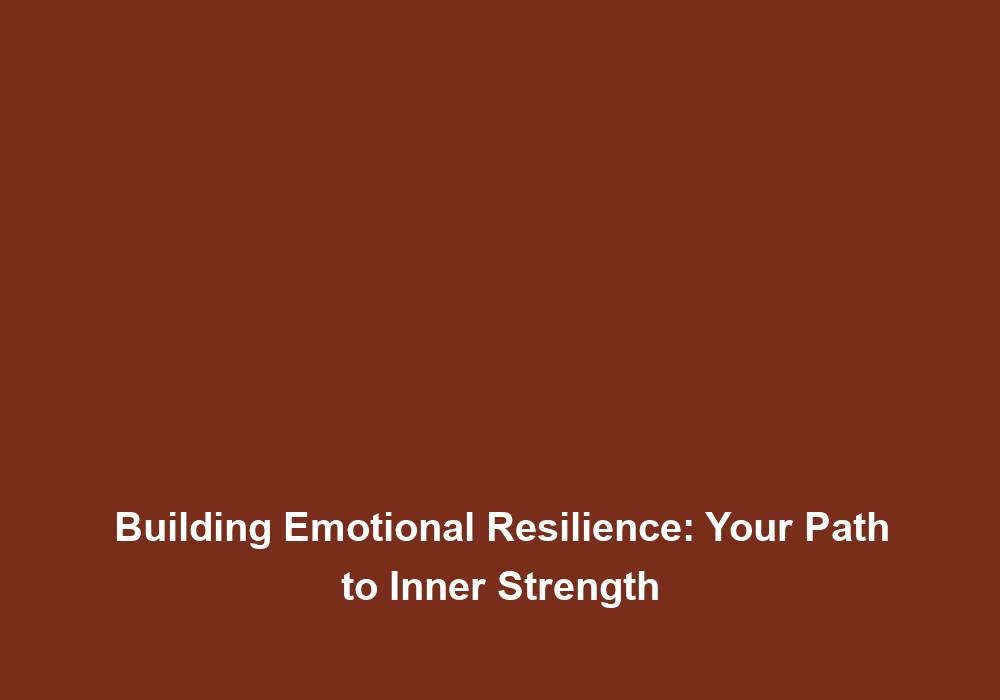Building Emotional Resilience: Your Path to Inner Strength
Emotional resilience is the ability to adapt and bounce back from difficult experiences, enabling individuals to cope with stress, overcome adversity, and maintain a positive outlook on life. It is an essential skill that can greatly impact one’s mental well-being and overall quality of life. In this article, we will explore the concept of emotional resilience and provide practical strategies to help you build inner strength.
Understanding Emotional Resilience
Emotional resilience is not about avoiding or suppressing emotions, but rather about managing and responding to them in a healthy and constructive manner. It involves developing a strong emotional foundation that allows you to navigate life’s challenges with greater ease and grace. Here are some key aspects to understand about emotional resilience:
- Self-Awareness: Emotional resilience begins with self-awareness. It involves recognizing and understanding your emotions, thoughts, and reactions to various situations. By being aware of your emotional state, you can better manage and regulate your responses.
Self-awareness is the foundation of emotional resilience. It involves being in touch with your emotions, thoughts, and reactions. By understanding how you feel and why you feel that way, you can better manage your emotions and respond to challenging situations. Take the time to reflect on your emotions and the triggers that may be causing them. This self-reflection will help you gain a deeper understanding of yourself and your emotional patterns.
- Emotional Regulation: Developing the ability to regulate your emotions is crucial for building resilience. This involves acknowledging and accepting your emotions, finding healthy ways to cope with them, and avoiding impulsive reactions.
Emotional regulation is the process of managing and controlling your emotions in a healthy and constructive way. It involves recognizing your emotions without judgment and finding appropriate ways to express and cope with them. This can be done through techniques such as deep breathing exercises, journaling, or practicing mindfulness. By learning to regulate your emotions, you can avoid impulsive reactions and make more rational decisions in challenging situations.
- Flexibility and Adaptability: Resilient individuals are able to adapt to change and navigate through uncertain situations. They are flexible in their thinking and open to new perspectives, which allows them to find alternative solutions and bounce back from setbacks.
Flexibility and adaptability are key components of emotional resilience. Being able to adapt to change and approach challenges with an open mind allows you to find creative solutions and overcome obstacles. Practice flexibility by challenging your own beliefs and considering different perspectives. This will help you develop a more adaptable mindset and increase your ability to navigate through uncertain situations.
- Positive Mindset: Cultivating a positive mindset is essential for emotional resilience. It involves focusing on strengths, maintaining optimism, and reframing negative thoughts into more positive and empowering ones. A positive mindset enables you to see challenges as opportunities for growth and learning.
Maintaining a positive mindset is crucial for building emotional resilience. This involves focusing on your strengths and accomplishments, rather than dwelling on your failures or setbacks. Practice gratitude and positive self-talk to shift your perspective from negative to positive. By reframing negative thoughts and focusing on the opportunities for growth and learning, you can build a resilient mindset that will help you overcome challenges.
Strategies for Building Emotional Resilience
Building emotional resilience is a lifelong process that requires consistent effort and practice. Here are some effective strategies that can help you develop inner strength and enhance your emotional well-being:
1. Cultivate Self-Care Practices
Prioritizing self-care is essential for building emotional resilience. This includes taking care of your physical, mental, and emotional well-being. Engage in activities that bring you joy, practice mindfulness or meditation, maintain a balanced diet, get enough sleep, and exercise regularly. Taking care of yourself holistically will provide you with the energy and emotional stability needed to face challenges.
Incorporate self-care practices into your daily routine to support your emotional well-being. This can include activities such as taking time for yourself, engaging in hobbies or activities you enjoy, and practicing relaxation techniques. Make self-care a priority and set aside dedicated time each day to focus on your well-being.
2. Develop Strong Support Systems
Having a strong support network is crucial for emotional resilience. Surround yourself with positive and understanding individuals who can offer emotional support and guidance during difficult times. Cultivate relationships with friends, family, or support groups who can provide a safe space for you to express your emotions and seek advice.
Building a strong support system is essential for emotional resilience. Reach out to trusted friends or family members who can provide a listening ear and offer support when needed. Consider joining support groups or seeking professional guidance if necessary. Having a network of people who understand and validate your emotions can greatly enhance your resilience.
3. Practice Emotional Regulation Techniques
Learning to regulate your emotions is a fundamental aspect of emotional resilience. Explore various techniques such as deep breathing exercises, journaling, or practicing mindfulness to help you manage stress and anxiety. Engaging in activities that promote relaxation and self-reflection can also aid in emotional regulation.
Developing emotional regulation techniques can help you better manage and respond to challenging emotions. Experiment with different techniques to find what works best for you. This can include deep breathing exercises to calm your mind and body, journaling to express and reflect on your emotions, or engaging in mindfulness practices to increase self-awareness and promote emotional balance.
4. Embrace Challenges as Opportunities for Growth
Instead of viewing challenges as obstacles, try to reframe them as opportunities for growth and learning. Embracing a growth mindset allows you to see setbacks as valuable experiences that can help you develop new skills and strengths. By shifting your perspective, you can approach challenges with a sense of optimism and determination.
Approach challenges with a growth mindset, which involves viewing them as opportunities for personal growth and development. Embrace the idea that setbacks and obstacles are part of life’s journey and can ultimately lead to positive outcomes. By reframing challenges as opportunities for growth, you can cultivate resilience and approach them with a positive and proactive mindset.
5. Develop Problem-Solving Skills
Building emotional resilience involves developing effective problem-solving skills. When faced with difficulties, break down the situation into smaller, manageable tasks. This will help you approach challenges step by step, making them feel less overwhelming. Developing problem-solving skills empowers you to find creative solutions and take control of challenging situations.
Enhance your problem-solving skills to better navigate through challenging situations. Break down problems into smaller, more manageable tasks and brainstorm potential solutions. Consider seeking advice from others or researching different approaches. By taking a proactive approach and breaking challenges into smaller parts, you can develop effective problem-solving skills and build emotional resilience.
6. Practice Self-Compassion
Be kind and compassionate towards yourself during challenging times. Treat yourself with the same understanding and empathy you would offer to a friend. Practice self-compassion by recognizing your strengths, forgiving yourself for mistakes, and practicing self-care without guilt. Self-compassion fosters resilience by nurturing a positive relationship with yourself.
Cultivate self-compassion as a way to nurture emotional resilience. Treat yourself with kindness and understanding when facing difficult emotions or setbacks. Practice self-care without feeling guilty and acknowledge your strengths and accomplishments. By practicing self-compassion, you can build a strong foundation of self-worth and resilience.
7. Seek Professional Support if Needed
If you find it challenging to build emotional resilience on your own, consider seeking professional support. A therapist or counselor can provide guidance, tools, and strategies to help you navigate through difficult emotions and experiences. Seeking professional help is a sign of strength and can greatly enhance your emotional well-being.
If you are struggling to build emotional resilience, do not hesitate to seek professional support. A therapist or counselor can provide a safe space for you to explore and work through your emotions. They can offer guidance, tools, and strategies to help you build resilience and enhance your emotional well-being.
Conclusion
Building emotional resilience is a journey that requires self-awareness, practice, and patience. By understanding the key aspects of emotional resilience and implementing the strategies outlined in this article, you can cultivate inner strength and navigate life’s challenges with greater ease. Remember, emotional resilience is not about eliminating struggles but rather developing the tools and mindset to overcome them. Embrace the process, be kind to yourself, and enjoy the growth that comes with building emotional resilience.
(Note: The content provided above is in markdown format, as requested.)







